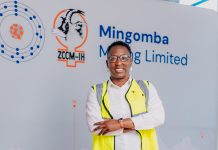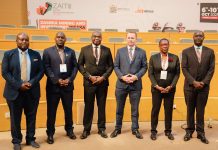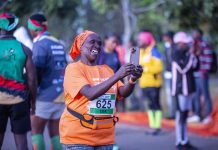When David first found out that he was HIV positive, it was like the world was caving in around him. For his wife Faith, it was even more of a shock. Although her husband’s HIV test results were positive, she had not contracted the virus. But, what initially seemed like a death sentence ended up turning David’s life around in ways he couldn’t have imagined. He joined the Integrated HIV/AIDS Program at the Malcolm Watson Hospital, co-funded by Mopani Copper Mines Plc, Zambia’s government, and PEPFAR (the United States President’s Emergency Plan for AIDS Relief).
Today, the 63-year-old is highly effective in HIV counselling and testing and travels within the Mufulira and Kitwe catchment area, where over 17 000 people have so far been given free Antiretroviral Treatment via the Mopani program. David’s wife Faith has remained by his side, and the two have learned how to safely live together with different HIV statuses, as a so-called “discordant couple”.
Read David’s inspiring story below.
When did you first get tested for HIV?
In 2011.
And where did you get tested?
I was directed to the Ronald Ross [a government hospital] by the doctor who first saw me when I fell ill in 2011. I was found HIV positive. The doctor told me to choose whether to continue with treatment there, or to come here [to the Malcolm Watson Hospital].
Why did you decide to come here?
It’s because the services are good. I used to work with Mopani. I had been impressed with the services that Mopani gives to clients and decided to continue coming to their facility, even during the process of being HIV positive. The services that we receive here are the best.
You mentioned falling ill in 2011. What was wrong?
I had been feeling very weak, and getting headaches. I started treatment for TB (tuberculosis) at this facility as soon as I was tested HIV positive.
How soon after your diagnosis did you start Antiretroviral Treatment (ART)?
Six months later, after the completion of my course of TB medication.
Were you working at the time?
No, I was already retired. I retired in 2004.
How did you feel when you were informed of your test results?
Well, in the first place, I couldn’t accept it. But through the counselling that I received from this institution – and through the support of my wife – I became more and more comfortable once I had started ART.
How long did it take you to feel better about the diagnosis?
From the time that I started feeling better physically. Today, I’m able to speak to you about this. My immunity has improved, my quality of life has improved. My viral load has been suppressed [through ART]. I’m even able to farm two acres of land!
He laughs.
Tell us about the counselling that you receive.
Actually, the medical staff here – together with my family – have taken care of my life, such that every time I come for review, they make sure to interview me to ask if I’m having any problems. Should I happen to say that there is some kind of a problem, they will tackle that. Not only that – they’ve also put me on an HIV skills program.
“My viral load has been suppressed. My quality of life has improved. I’m even able to farm two acres of land!”
Tell us about the program.
I’ve now become a Community Health Worker under this institution. I do psycho-social counselling, HIV counselling, and testing in the community. Now that I’m equipped with information, I’m able to work with the community and convey all that information to them.
It must be very rewarding to give people information that they need, and to change their attitudes.
Yes. You see, because of the skills we’ve acquired and the training we’ve undergone, people can learn to accept [a positive HIV status]. There are some people, especially old men at my age, who find it difficult to accept. You know, there is a lot of stigma [associated with HIV]. When they see an old man like me, it’s a bit easier to talk about, and to understand. If we feel we are having a problem with a particular client, we do sometimes disclose our status. “Look, I’m also positive. And look at my health.” You continue visiting them, and eventually you find that he or she accepts it.
Counselling people must be a very difficult job.
David chuckles.
It’s not difficult if we start with proper counselling. We start with open-ended questions about HIV. If people’s response is that they don’t know, then you start explaining the basics of HIV and AIDS. How we can prevent spreading HIV to others… Things of that nature. Once they understand and have accepted the information, that’s when it comes to testing. After we’ve tested them, we ask: Can I now give you the results? That client has to respond: “Yes, give me the results.” When counselling was adequate in the first place, then we don’t have problems.
Faith, you’re obviously a very supportive person and, although you and David are both going through a challenge, yours is quite unique. How do you find peace of mind?
I’ve got peace of mind because I’ve accepted my husband’s status.
What helped you to accept it?
Love – that’s number one. That’s love! (Laughter.) The counselling I went through helped me too.
David, when did you first meet?
We met in 1999 in Mufulira, and were married in 2000.
Do you have any children?
Yes, I have five children. My wife and I have two children together – a boy and a girl. Our son is 15 and our daughter is eight.
Did you start educating your children about HIV from a young age?
Yes, definitely. As I am speaking to you now, my [HIV negative] son is living with his HIV positive wife, as a discordant couple. Now, if I hadn’t gotten all of this information, as a father I would have said, “Get divorced”. But I have given him information and said, “Please, this is not the end of everything. You can continue living together in this situation.”
What do you value most about your experience at this centre [Malcom Watson]?
I’ve really benefited tremendously. As I said earlier on, I’ve been assigned to the Mopani HIV program, whereby I am able today to give a service to the rest of the community – even to my family, and their family. I am a Community Health Worker. I do the counselling, and I test there and then. Where I have found a client is HIV positive, immediately I bring them to this facility, and they take care of it. The service that the medical staff here give to us clients – and to anyone who comes here – is the best. It was just yesterday, Monday, when I was giving a health talk to the clients who came here. They are very impressed with the services that they – well, that we – are given at this facility. I come here and we talk and discuss [HIV] with the community every Monday.
Is it helpful for support groups to meet every week?
Yes, it’s very, very helpful.
Tell us more.
I feel it’s helpful because I wouldn’t want other people to go through what I went through. I would like to offer the information that I have acquired to others, so that this information is disseminated everywhere. Even my wife here, she has had friends who have that stigma [about HIV]. When she talked to them and said, “Come and see my husband, he’s a counsellor,” they came to me for help.

Nobody but your wife and the staff here knows your HIV status. Do you worry that people wonder why you decided to become a counsellor?
No, because initially when I was working for Mopani, I was assigned to talk to people as a social and marriage counsellor. So, it’s that experience that really gave me a zeal [for counselling]. When one is doing something like this, there must be zeal, and a determination to share information.
***
David* and his wife Faith* spoke to Mining For Zambia at the Malcolm Watson Hospital, one of the bases for the Integrated HIV/AIDS Program, along with Wusakile Mine Hospital in Kitwe, and several satellite clinics. In November 2007, Mopani Copper Mines (in partnership with Catholic Relief Services and PEPFAR) opened up the program to the general public. Today, approximately 10,000 clients are currently receiving ART, psycho-social counselling and – where clients’ viral load is sufficiently supressed – deliveries of medication to their home by Community Health Workers such as David.
*Names have been changed to protect the interviewees’ identities
See also: How Mopani Copper Mines is stamping out malaria in the Copperbelt

























